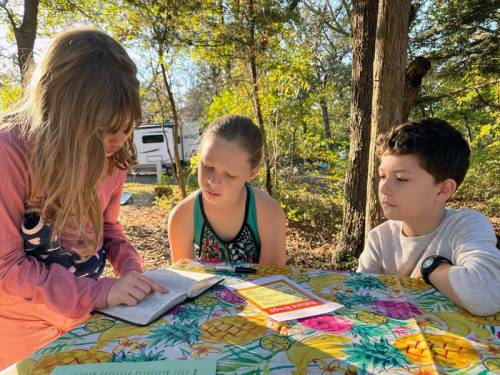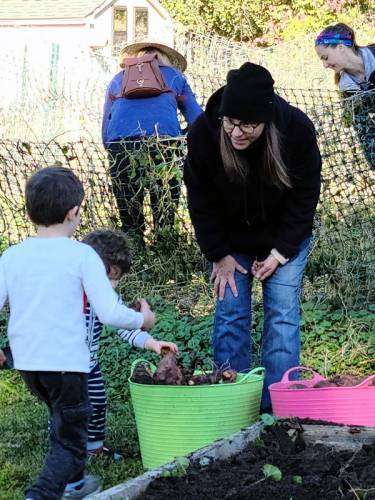The call to serve begins early
By Zeena Regis | Presbyterians Today

Children at Second Presbyterian Church in Indianapolis gather to read the Matthew 25 passage and ask the question, “What can we do to help?” Courtesy of Second Presbyterian Church
From planting vegetable gardens to assembling care kits for homeless neighbors, the Matthew 25 invitation that was extended by the Presbyterian Church (U.S.A.) in 2019 to live out the love of Christ by caring and advocating for the “least of these” has brought purpose and energy to countless congregations. To date, nearly 1,100 churches, groups and mid councils have committed to being Christ in the flesh in their communities. But nowhere is the future of PC(USA) more promising than in the way Matthew 25 is being used to transform churches’ children and youth ministries.
As part of the Matthew 25 commitment, congregations pledge to focus on one or more of three areas: building congregational vitality, dismantling structural racism and eradicating systemic poverty. While the language of the three focus areas may seem to be difficult concepts for children to grasp, Christian educators and youth leaders are finding that the concepts resonate with children and youth, especially when they are rooted in story and community action.
The Matthew 25 vision offers congregations an opportunity to link the larger story of the church’s mission to concrete, daily experiences in children’s lives. In the Scripture verses that read, “I was hungry and you fed me; I was thirsty and you gave me a drink; I was homeless and you gave me a room; I was naked and you gave me clothes; I was sick and you stopped to visit; I was in prison and you came to me,” the tangible concepts of hunger, thirst, lack of clothing and imprisonment offer opportunities for meaningful engagement at all stages of faith development.
At First Presbyterian Church of Stillwater, Oklahoma, Jenna Campbell, director of children and youth ministry, asks children and youth who are the hungry, thirsty, sick, imprisoned and naked in their communities and what their faith calls them to do in response to seeing such needs. “It might not be who we first think of when we think of who is hungry or thirsty,” she said.
The exploration of that question has sparked a lot of conversations, she added. And along with the talk has come action. In thinking about issues of hunger, the children and youth at First Presbyterian have prepared what they call “compassionate meals” for people facing tragedy and loss. They have also filled the many little free pantries — those stand-alone boxes in the community offering food to the public 24/7 — to ensure that families experiencing food insecurity have access to healthy meals. In considering thirst, youth learned about water justice issues worldwide and how to make a difference in the movement to help all people find clean water. And through each activity, Campbell invites the young to keep asking, “Why?” Why is there hunger? Why do people thirst?
“So much of living out the Matthew 25 vision for adults has been about unlearning our prejudices and harmful patterns. For children and youth, we’re able to get ahead of that and teach them what it means to be a faithful disciple living out Matthew 25. They get the opportunity to ask questions about difficult issues in our society and then ask what a faithful response would be to those issues,” said Campbell. “I love seeing the children starting with questions about who God is and who Jesus is and how is the Holy Spirit moving around us.”
Campbell has also noticed that in the questioning, more conversations happen within families. “It’s been wonderful to hear about the conversations sparked at the dinner table because of our Matthew 25 work,” she said. “We are really excited about the connections that the children are making and the ideas that they are coming up with to put their faith into action.”
Similarly, Christian Antwi, director of ministries to children, youth and families at Atlanta’s Central Presbyterian Church, encourages them to ask questions about their faith. One that has been very impactful in his own ministry has been the question many Matthew 25 congregations begin with: If this church were to close, would our neighbors and surrounding community miss us? Antwi says that sharing this thought-provoking and revealing question with his teens has led to them forming “an even deeper connection with the ministries of the Central Night Shelter and the Central Outreach and Advocacy Center.” Volunteering with individuals and families experiencing homelessness and poverty brings the Scripture’s vision to life for the youth, moving the issues of affordable housing, homelessness and accessible healthcare into focus.
Congregations like Central Presbyterian are finding that Matthew 25 offers opportunities to explore the communal practices of faith and justice with the younger followers of Christ. It also helps children and teens perfect skills in how to share the Good News with others — something many adults still grapple with.
“I enjoy watching some of the kiddos who are typically shy and introverted, even with people that they know, overcome that shyness. I see them interacting with our neighbors who are experiencing homelessness and having these in-depth conversations with them. They often come back from those interactions excited and with their worldview expanded,” said Antwi.
The expanded worldviews seem to be a hallmark of the Matthew 25 vision. Many congregations have used the Matthew 25 commitment as a catalyst for intergenerational and intercultural conversations.
Will Massey, youth and missions director at Highland Presbyterian Church in Lancaster, Pennsylvania, found that an unexpected conversation with a Kenyan restaurateur provided a thoughtful and resonant conversation with the youth in the congregation. One day, the youth group ordered food from a local Kenyan catering company. They chose that company because the proceeds support various immigrant causes. When the food was delivered to the teens by the chef himself, the chef stayed for what was a lengthy conversation with the teens, Massey said. “The youth were able to listen to the entrepreneur’s story and connect it to the larger issue of hunger,” he said, adding, “While service has always been a part of many youth ministries, Matthew 25 is offering language and a framework to deepen and enhance that work.”
Faith concepts for children
At Second Presbyterian Church in Indianapolis, Kathryn “Kat” Green-Ross, a certified Christian educator and coordinator of children’s ministries, shares the Matthew 25 vision in what she calls a “child forward” approach, which is making sure spiritual concepts are accessible for children. Adapting the concepts of faith to language “that fits in the mouth of a child” is especially important to Green-Ross’ ministry.

Children learn at an early age how God calls them to help the “least of these” by growing food for others. Courtesy of Second Presbyterian Church
The children of Second Presbyterian, for example, use the language of “caretaking for Christ” which invites them to help, share with and care for others as a way of expressing their faith. Green-Ross has also adapted six questions from the Matthew 25 Scripture for children to explore. Children are invited to wonder how they can become caretakers for Christ through a litany that goes: “I wonder what I can do for someone who is hungry. I wonder what I can do for someone who is thirsty. I wonder what I can do for someone who is homeless. I wonder what I can do for someone who is shivering. I wonder what I can do for someone who is sick. I wonder what I can do for someone who is in prison.”
Jill Carrel, a member of Second Presbyterian, is especially grateful for the child-forward approach as it has helped her daughter, Katie, understand better the call to reach out to others. According to Green-Ross, Jill and Katie are regular volunteers with the Northside Food Pantry, which is housed in the church. Says Jill Carrel, “We are hoping to build a family focused on serving others.” This focus has never been as important as now, Carrel noticed, because the pandemic has heightened the need for accessibility to food, especially fresh produce, among Second Presbyterian’s neighbors. Northside Food Pantry has operated curbside since the pandemic began in 2020. Families come up to the volunteers where, Carrel said, “we discuss their food needs.” Then, with a list in hand, the volunteers, like Carrel and her daughter, go inside to “shop.”
“When I receive a shopping list, I immediately begin praying that the food this ministry is providing will nourish the family,” said Carrel. “I shop for our pantry families as I do for my own — selecting food and household items with care and gratitude.”
As a mother, Carrel says that being part of this work is a beautiful realization of the words written in Matthew 25 — and it’s work that she gets to do with her daughter by her side.
“It’s a meaningful witness to the gift of being in community with one another,” she said. And that is something Matthew 25 is inviting children and teens to be part of.
Zeena Regis is a member of Oakhurst Presbyterian Church and a ministry fellow at North Decatur Presbyterian Church in Decatur, Georgia.
Support Presbyterian Today’s publishing ministry. Click to give
![]() You may freely reuse and distribute this article in its entirety for non-commercial purposes in any medium. Please include author attribution, photography credits, and a link to the original article. This work is licensed under a Creative Commons Attribution-NonCommercial-NoDeratives 4.0 International License.
You may freely reuse and distribute this article in its entirety for non-commercial purposes in any medium. Please include author attribution, photography credits, and a link to the original article. This work is licensed under a Creative Commons Attribution-NonCommercial-NoDeratives 4.0 International License.